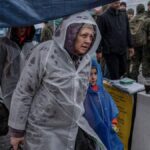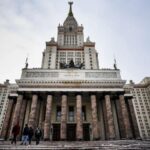
The Russian ambassador had heard enough about global food shortages caused by his nation’s invasion of Ukraine so, when it was his turn to speak, Vasily Nebenzya offered a classic Kremlinesque retort: He blamed the West.
If not for the West’s “unbridled sanctions hysteria” against Russia, Nebenzya told the United Nations Security Council on Wednesday, there would be no threat of starvation among Ukrainians; food would still flow from Ukraine, the “breadbasket of Europe,” to countries that need it. The United States and other western nations can prevent food shortages, Nebenzya said, “no matter how much they try to shift blame” to Russia.
And, he added — because it’s in the Russian script — if “Ukrainian Nazis and radicals” would just lay down their arms, there would be no crisis.
It was all maddening and absurd: Moscow’s U.N. ambassador blaming the victims of Russia’s bombardments for their predicament and, further, blaming the international sanctions imposed on Russia for disruptions in the production and export of Ukrainian and Russian wheat, corn, sunflower oil and other staples.
Just stop the sanctions, Nebenzya said, and there will be no famine.
Sitting nearby, and having spoken moments earlier about the looming crisis, was Wendy Sherman, the U.S. deputy secretary of state, Baltimore native and alumnus of Pikesville High School and the University of Maryland School of Social Work.
Sherman, now a seasoned diplomat representing the U.S. at a session of the Security Council, had sounded warnings about the possibility of famine due to Russia’s “unjustified and brutal invasion of Ukraine.” Nearly a quarter of Ukraine’s population has been displaced, she said, and nearly 4 million Ukrainians have fled the country. The only one to blame for that, she said, was the Russian president, Vladimir Putin.
“Russia’s ceaseless bombardment of Ukraine cities and critical infrastructure has created one of the fastest growing humanitarian crises in recent decades,” Sherman had told the council.
Now, having listened to the Russian ambassador’s response, she had more to say.
“First,” she said, “I want to be clear that the conflict that is being suffered by the Ukrainian people is not about the Russian Federation versus the West. One hundred and forty countries, just last week, spoke in support of ending this conflict and the need to end this humanitarian crisis.
“So, with all due respect, Mr. Ambassador, this is not about Russia versus the West. This is about the support of the UN Charter and the principles of sovereignty, territorial integrity and the right of all countries — all countries — to choose their political orientation and their foreign policy.
“I myself was engaged directly with Russian counterparts to find a peaceful way forward to meet the concerns of the Russian Federation,” Sherman added. “President Putin chose an invasion, not diplomacy.”
Sherman has been deputy to Secretary of State Antony Blinken since last April, but her experiences in the State Department go back to the Clinton administration, the years after the breakup of the Soviet Union and during wars in the former Yugoslavia.
She served secretaries Warren Christopher and Madeleine Albright and, during the Obama administration, John Kerry and Hillary Clinton. Sherman was lead negotiator for the Iran nuclear deal.
Marylanders remember her as the savvy chief of staff for then-Rep. Barbara Mikulski and the manager of Mikulski’s first successful campaign for the Senate in the 1980s. Among a variety of positions she held over the years, Sherman served as Maryland’s special secretary for children and youth.
Now, on the world stage, Sherman used her moment at the UN to challenge Russia, and she did so in the perfect pitch of a diplomat armed with facts and moral clarity.
“With all due respect, Mr. Ambassador,” she said, “as a Jewish American, I cannot help but say this is not about Nazis in Ukraine. Last week, former U.S. Secretary of State and former Permanent Representative to this Council — and one of my most cherished personal friends — Madeleine Albright, died. She loved representing the United States here. She would have been outraged by the words of the Russian Federation today.
“Later in her life, she learned that her parents raised her as Catholic to protect her from the Nazis because her family was Jewish. She learned that three of her grandparents died at the hands of the Nazis while in concentration camps. She knew that the Jewish president of Ukraine [Volodymyr Zelenskyy] was certainly not a Nazi, and that the citizens of Ukraine being slaughtered and starving, and without food and medicine … are not and never were Nazis.”
Sherman never raised her voice to express anger, something experienced diplomats manage to do in the face of obvious lies and infuriating claims. There’s powerful authority in that voice, and after the Trump years, when a demoralized State Department experienced a serious brain drain under the administrations of Rex Tillerson and Mike Pompeo, it seemed possible, in this moment at the UN, that America could regain its credibility and leadership.
“Finally,” Sherman said, bringing the hearing back to its purpose, “this dialogue today is about the humanitarian needs of Ukrainian civilians and people around the world …
“We must all do whatever we can to stop war. But there is an easy choice here. And it is a choice that can be made today by President Putin, and that is to stop the war. So let us all, over 140 countries around the world, continue to stand with Ukraine.”




